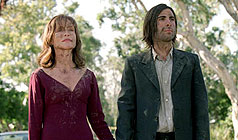|
|
|
|
I
|
 |
|
Australian critics and moviegoers have been complaining for years about quirky local comedies. They should have paused to notice that quirkiness has taken on massive, even metaphysical proportions at the progressive end of commercial American cinema. Directors Wes Anderson (Rushmore, 1998) and Paul Thomas Anderson (Punch-Drunk Love, 2002), as well as screenwriter Charlie Kaufman (Adaptation, 2002), have spearheaded this movement. Their plots have become increasingly surreal, the production design more cartoon-like, the performances more outlandishly histrionic. And their characters all tend to be quiet obsessives, squirreling away neurotically at some grand plan comprehensible to none but themselves. David O. Russell's
I And, most crucially – just like in a Kaufman script – the central characters do not merely suffer from psychic problems of repression, emotional dissociation, traumatic memory, and so on; they also have expert counsellors on hand, trailing them at all times. These self-styled Existential Detectives, Bernard (Dustin Hoffman) and Vivian (Lily Tomlin), are the quirky heart of this unique movie. The head of the movie, however, is located elsewhere. Caterine Vauban (a sublime Isabelle Huppert) is a nihilistic, postmodern French philosopher whose credo is "meaninglessness, manipulation, cruelty". She is the gremlin who mucks up all the holistic, New Age-style therapeutic work of Bernard and Vivian, spreading the seeds of corrosive doubt. And these seeds find root in the agonised souls whom Albert finds in the course of his adventure of self-discovery, such as the decorated fireman, Tommy (Mark Wahlberg). In the wake of the
Twin Towers attack, the humble, hard-working fireman has become the new,
mythic hero of American culture (as Ladder 49 [2004] attests).
In I It is impossible
to reduce I The first line is freewheeling, spontaneous, constantly re-inventing itself. Strange new characters, like the Huckabees poster girl Dawn (Naomi Watts), keep popping up and taking the story somewhere unpredictable. To keep us off-guard, Russell begins the story well after its starting-point – the meeting between Albert and his corporate nemesis, Brad (Jude Law) – and systematically leaves out major, turning-point incidents. At times, this waywardness feels a little clunky and clumsy. To counter-balance
all this craziness, however, the other line of the film is devoted to
meltdown. Everybody in this tale is cracking up, falling apart, coming
unglued (literally, according to the special effects). All their preconceptions
and assumptions about the world and their place in it are in the process
of being shattered – and reunification of identity is sometimes
an ambiguous prospect. As a result, I Director and co-writer
Russell has steered a slow, gradual course of artistic development since
his feature debut, Spanking the Monkey
(1994). Only now, in the light of I Russell is fixed on the group, the community. What unites people within a family, a military team, a political lobby-group, a corporate think-tank or an artistic movement? Is it a sense of filial responsibility, perverse desire, ethical commitment, or mere habit? Russell is alive to all these possibilities, and (more importantly) the confusion and overlap between them. Best of all, I
MORE Russell: Soldier's Pay © Adrian Martin December 2004 |
![]()